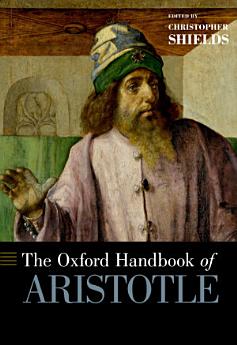The Oxford Handbook of Aristotle
Christopher Shields
2012 ജൂൺ · Oxford University Press
ഇ-ബുക്ക്
744
പേജുകൾ
family_home
യോഗ്യതയുണ്ട്
info
reportറേറ്റിംഗുകളും റിവ്യൂകളും പരിശോധിച്ചുറപ്പിച്ചതല്ല കൂടുതലറിയുക
ഈ ഇ-ബുക്കിനെക്കുറിച്ച്
The Oxford Handbook of Aristotle reflects the lively international character of Aristotelian studies, drawing contributors from the United Kingdom, the United States, Germany, France, Switzerland, Italy, Canada, and Japan; it also, appropriately, includes a preponderance of authors from the University of Oxford, which has been a center of Aristotelian studies for many centuries. The volume equally reflects the broad range of activity Aristotelian studies comprise today: such activity ranges from the primarily textual and philological to the application of broadly Aristotelian themes to contemporary problems irrespective of their narrow textual fidelity. In between these extremes one finds the core of Aristotelian scholarship as it is practiced today, and as it is primarily represented in this Handbook: textual exegesis and criticism. Even within this more limited core activity, one witnesses a rich range of pursuits, with some scholars seeking primarily to understand Aristotle in his own philosophical milieu and others seeking rather to place him into direct conversation with contemporary philosophers and their present-day concerns. No one of these enterprises exhausts the field. On the contrary, one of the most welcome and enlivening features of the contemporary Aristotelian scene is precisely the cross-fertilization these mutually beneficial and complementary activities offer one another. The volume, prefaced with an introduction to Aristotle's life and works by the editor, covers the main areas of Aristotelian philosophy and intellectual enquiry: ethics, metaphysics, politics, logic, language, psychology, rhetoric, poetics, theology, physical and biological investigation, and philosophical method. It also, and distinctively, looks both backwards and forwards: two chapters recount Aristotle's treatment of earlier philosophers, who proved formative to his own orientations and methods, and another three chapters chart the long afterlife of Aristotle's philosophy, in Late Antiquity, in the Islamic World, and in the Latin West.
രചയിതാവിനെ കുറിച്ച്
Christopher Shields is George N. Shuster Professor of Philosophy at the University of Notre Dame. He is the author of Order in Multiplicity: Homonymy in the Philosophy of Aristotle, Classical Philosophy: A Contemporary Introduction, Aristotle, Ancient Philosophy: A Contemporary Introduction, and, with Robert Pasnau, The Philosophy of Thomas Aquinas. He is the editor of The Blackwell Guide to Ancient Philosophy. Forthcoming is Aristotle's De Anima, Translated with Introduction and Notes.
ഈ ഇ-ബുക്ക് റേറ്റ് ചെയ്യുക
നിങ്ങളുടെ അഭിപ്രായം ഞങ്ങളെ അറിയിക്കുക.
വായനാ വിവരങ്ങൾ
സ്മാർട്ട്ഫോണുകളും ടാബ്ലെറ്റുകളും
Android, iPad/iPhone എന്നിവയ്ക്കായി Google Play ബുക്സ് ആപ്പ് ഇൻസ്റ്റാൾ ചെയ്യുക. ഇത് നിങ്ങളുടെ അക്കൗണ്ടുമായി സ്വയമേവ സമന്വയിപ്പിക്കപ്പെടുകയും, എവിടെ ആയിരുന്നാലും ഓൺലൈനിൽ അല്ലെങ്കിൽ ഓഫ്ലൈനിൽ വായിക്കാൻ നിങ്ങളെ അനുവദിക്കുകയും ചെയ്യുന്നു.
ലാപ്ടോപ്പുകളും കമ്പ്യൂട്ടറുകളും
Google Play-യിൽ നിന്ന് വാങ്ങിയിട്ടുള്ള ഓഡിയോ ബുക്കുകൾ കമ്പ്യൂട്ടറിന്റെ വെബ് ബ്രൗസർ ഉപയോഗിച്ചുകൊണ്ട് വായിക്കാവുന്നതാണ്.
ഇ-റീഡറുകളും മറ്റ് ഉപകരണങ്ങളും
Kobo ഇ-റീഡറുകൾ പോലുള്ള ഇ-ഇങ്ക് ഉപകരണങ്ങളിൽ വായിക്കാൻ ഒരു ഫയൽ ഡൗൺലോഡ് ചെയ്ത് അത് നിങ്ങളുടെ ഉപകരണത്തിലേക്ക് കൈമാറേണ്ടതുണ്ട്. പിന്തുണയുള്ള ഇ-റീഡറുകളിലേക്ക് ഫയലുകൾ കൈമാറാൻ, സഹായ കേന്ദ്രത്തിലുള്ള വിശദമായ നിർദ്ദേശങ്ങൾ ഫോളോ ചെയ്യുക.






